After learning about contract-for-differences (CFDs), the next natural thing investors and traders want to know is where they can find the best CFD brokers. The fact that there are hundreds of these platforms out in the wild doesn't help matters, making it increasingly difficult to pick the most reliable ones.
If you're having issues with selecting a broker, then you'll definitely find this article insightful. We provide a list of the best CFD brokers for UK customers, revealing the pros, cons, and literally all of the information you need to know about each of them.
Table of Contents
However, before we explore the list, let's get to know what a CFD broker is and what makes them different from your regular cryptocurrency exchange or trading platform.
What is a CFD broker?
Put simply, a CFD broker is a platform where you can trade contract-for-differences (CFDs). CFDs are investment products that let you profit from the price increase or decrease of an asset, without the difficulty associated with holding the asset itself.
For instance, when you trade cryptocurrencies with a CFD broker, you can make profit by either going long (buying in hope of an increase) or short (buying to sell at a lower price for profit). However, you are usually unable to withdraw the underlying cryptocurrency to your personal wallet. You can only make cash profits if trades go your way.
With online CFD providers, you can trade a range of assets including stocks, cryptocurrencies, ETFs, commodities, precious metals, etc.
Best CFD trading platforms in the UK
1. Capital.com – The UK CFD Trading Platform
Platforms: Web, Mobile (iOS, Android)
Capital.com is an online trading platform where users can trade financial markets using derivatives including CFDs (Contracts for Difference), and spread betting in the UK. In other words, you do not physically own the asset itself but trade based on its price movements. On the platform, you can trade popular markets like forex, stocks, indices, and commodities all in one place. Capital.com operates as a FCA-licensed broker in the UK, offering learning tools, market insights, and risk management features to help users understand what they are doing before placing trades.
Features
- Smart Charts with Advanced Tools
- Educational Hub and Integrated News
- Commission-Free Trading (other fees apply)
- Risk Management Tools Built In
Pros
- FCA-regulated in the UK.
- No inactivity and withdrawal fees.
- Negative balance protection for UK users.
- Beginner-friendly mobile app experience.
- In-depth learning and education tools.
- Wide range of CFD and spread betting markets (spread betting UK only).
Cons
- No physical asset ownership.
- Overnight fees on open positions.
- No crypto selection for UK clients.
2. XTB – Most Popular CFD Trading Platform UK
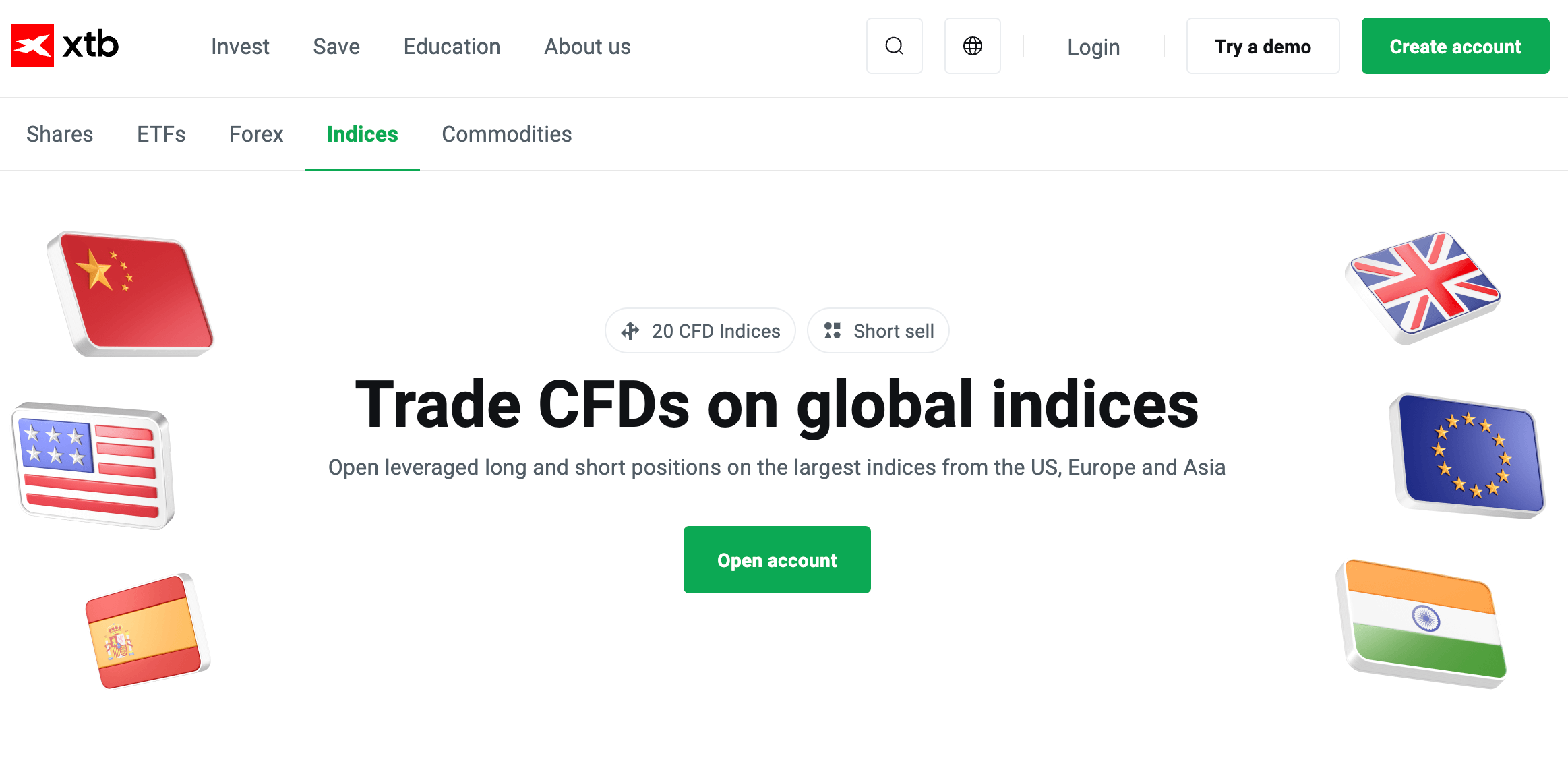
Platforms: Web, Mobile, Desktop (Windows, Mac)
XTB launched in 2006, providing an online trading platform for currencies, indices, and commodities. The company is regulated by the UK FCA and offers access to stocks and ETFs via CFDs.
XTB's flagship xStation 5 platform combines powerful analytical capabilities with an intuitive interface, featuring advanced charting tools, real-time market data, and comprehensive technical analysis indicators.
Features
- 2100+ financial markets
- Demo account
- Educational content for beginners
- Advanced charting and trading tools.
- Leverage trading up to 1:30
Pros
- XTB has a simple and intuitive user interface ideal for even first-time investors.
- Customer support is readily available via LiveChat.
- There is no minimum deposit amount, although users have to deposit just enough to open a position.
- Deposits are available via bank card, bank transfer, PayPal, and Skrill.
- The platform charges zero commissions for trading forex, indices, and commodities
Cons
- XTB only has CFDs for four cryptocurrencies.
- There is no social trading or community feature.
3. eToro — The Safest Choice

Platforms: Web, Android, iOS
eToro brands itself as the “world’s leading social trading platform,” with over 20 million registered users. The platform launched in 2007 as RetailFX, but has since rebranded to eToro and expanded its range of products. eToro offers CFD trading covering currencies, stocks, commodities, indices, and cryptocurrencies.
Features
- Demo account for beginners
- 2000+ financial instruments.
- Copy-trading and portfolio management.
- Educational materials
- Leveraged trading
- Analytics tools and advanced trading functionalities.
Pros
- The mobile and web interface is highly intuitive and easy to navigate for beginners.
- eToro supports a wide range of assets, allowing investors exposure to the global financial market from one interface.
- The platform is highly regulated and offers a high level of protection for user funds.
- eToro is transparent regarding the fees associated with trading CFDs on their platform.
- Users can fund their accounts using multiple payment methods such as wire transfers.
- The minimum deposit amount for users in most jurisdictions is just $50.
Cons
- Users report a long wait time for account verification or when they reach out to the customer service desk.
- While eToro supports crypto withdrawals to an in-house wallet service (eToro Money
- Crypto Wallet), the process isn’t straightforward and could take several days.
- Users cannot fund their eToro account using cryptocurrencies.
- There is a compulsory $5 fee for withdrawals and additional fees for conversions into currencies other than USD.
4. AvaTrade — Best Forex and Crypto CFD Broker

Platforms: Web, Desktop, iOS, Android.
AvaTrade is a highly regulated CFD trading platform with nine licenses across multiple jurisdictions. The platform allows trading in most financial markets and is readily available on multiple devices.
Features
- 1250+ assets
- Demo account
- Islamic account
- Commission-free trade.
- Social Trading Interface (AvaSocial)
- Quality educational content
- Professional trading account
- An inbuilt risk management tool for downsizing losses (AvaProtect).
Pros
- The platform has a user-friendly interface.
- Being heavily regulated means that users can trade with confidence.
- AvaTrade supports a wide range of assets, including eight cryptocurrencies.
- Users can deposit using a range of payment methods such as Neteller, Skrill, credit cards and wire transfers. PayPal is supported in a limited number of countries.
- The minimum deposit of $100 is relatively affordable for beginners compared to other competitors.
- Customer support is available via LiveChat which allows for a quicker response.
Cons
- Being heavily regulated also has its downside. For instance, users are compelled to withdraw their initial deposit amount using the same funding source.
- AvaTrade has a high inactivity fee of up to $50 per quarter for dormant accounts
5. PepperStone — Best Offshore CFD Broker For UK
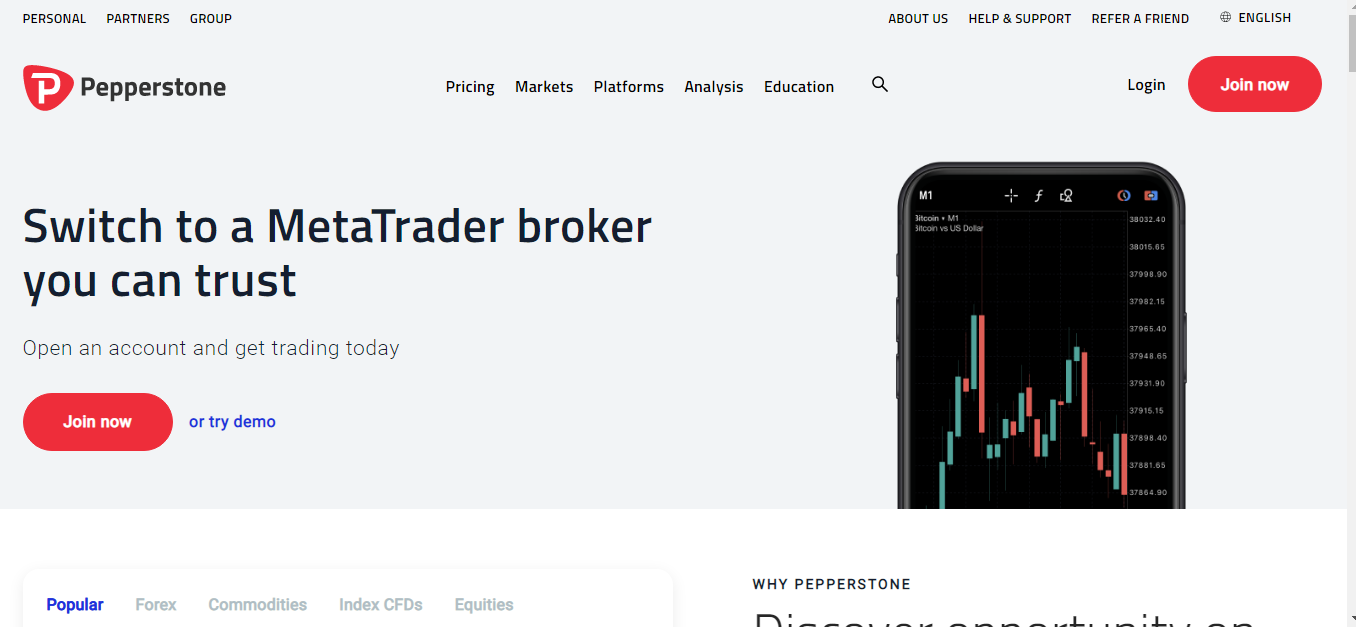
Platforms: Desktop, iOS, Android
Based in Kenya but available to UK people, PepperStone offers advanced CFD trading covering some of the most popular financial instruments. The platform claims to offer the tightest spread and fastest execution, with an average speed of 25 milliseconds.
Features
- 1000+ financial instruments
- Demo trading
- Leveraged trading
- Educational content
- Advanced trading tools, including API trading, AutoChartist, etc.
- High leverage for experienced traders.
Pros
- Users can expect an easy-to-use interface.
- Pepperstone is transparent regarding spreads and fees associated with using their platform.
- Users only need one account to access multiple trading interfaces such as MetaTrader4, MetaTrader5, and cTrader.
- The broker also provides customer support via LiveChat, email, and phone.
- Pepperstone supports a range of deposit options including Paypal, credit cards, and Bank Transfer.
Cons
- Compared to competitors, Pepperstone offers fewer financial instruments.
- The platform does not support crypto CFD trading for UK customers.
- There is no copy trading feature.
6. CMC Markets — Best Reputable CFD Trading Platform
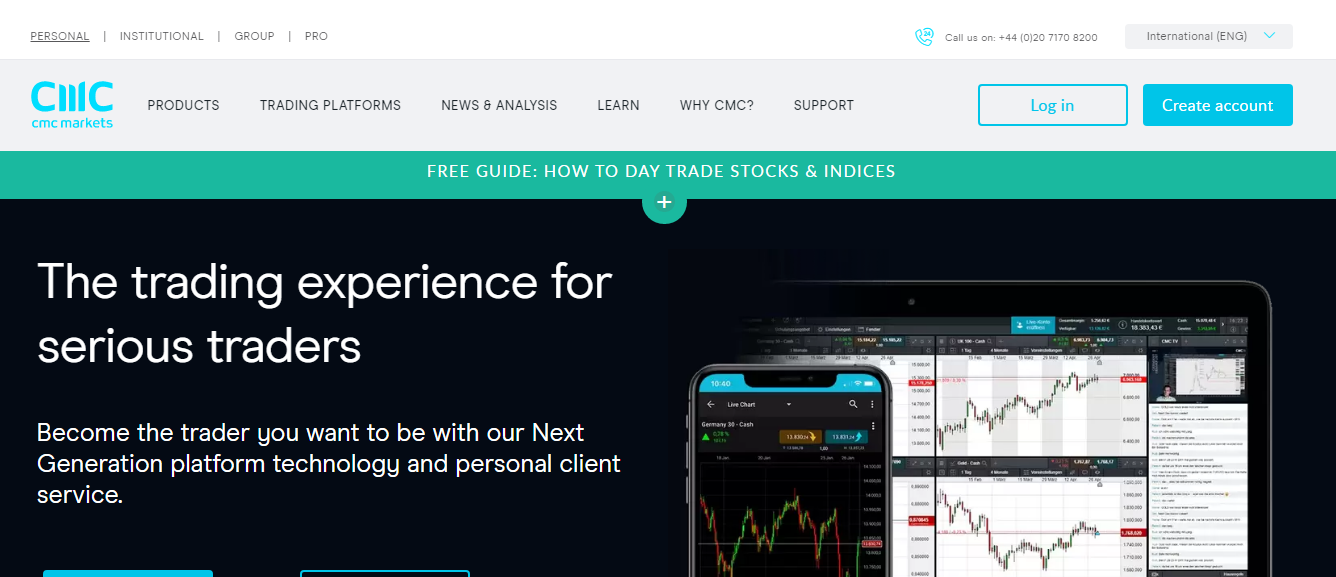
Platforms: Web, Android, iOS
Founded in 1989, CMC Markets is one of the oldest platforms on this list of the best CFD brokers. The platform is FCA-regulated and offers a broad mix of financial instruments for both retail, professional, and institutional traders.
Features
- 9500+ financial instruments.
- Demo account
- CFD margin trades
- Multiple order types and charting tools.
- Segregated accounts for different classes of investors.
- Client sentiment tool for gauging how other CMC Markets users are investing.
Pros
- CMC Markets has a proven track record, with the company listed on the London Stock Exchange.
- CMC Markets has a highly responsive customer support team.
- There are no platform withdrawal fees. Users can only incur fees from their chosen deposit or withdrawal gateway provider.
- The monthly inactivity fee is relatively low at £10, and only applies if an account is dormant for over a year.
- There is no minimum deposit amount, making it a good choice for low capital traders.
Cons
- The verification process can be slow at times.
- There is no social trading interface.
7. City Index — UK CFD Broker With Free Deposit and Withdrawals
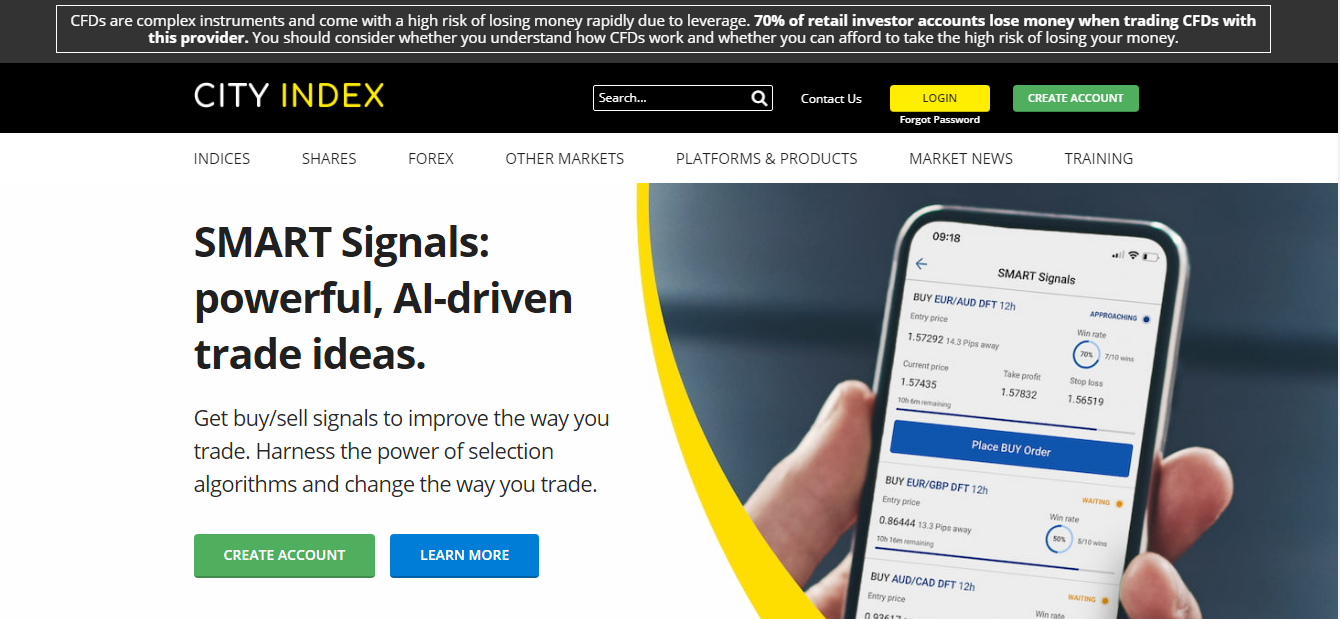
Platforms: Desktop, Web, Android, iOS.
City Index is a London-based CFD brokerage platform launched in 1983. The platform provides access to a wide range of traditional assets via CFDs but does not allow for cryptocurrency trading. The parent company is StoneX Group Inc, a publicly-traded company on the NASDAQ stock exchange.
Features
- 12,000+ global markets
- Demo account
- Advanced trading and charting tools.
- Educational content and regular market analysis.
- Premium Trader account with advanced benefits.
- Margin and Leverage trading.
Pros
- City Index has built up a proven track record as a CFD brokerage platform.
- The platform is regulated by the FCA and insured under the Financial Services Compensation Scheme (FSCS).
- The exchange is transparent regarding associated spreads and fees.
- There are no deposits or withdrawal charges.
- Positions held on the platform are subject to corporate action and dividends.
Cons
- City Index does not offer crypto CFDs at the time of writing this article.
- There is no social trading feature for customers.
8. Plus500 — Highly-rated CFD Provider
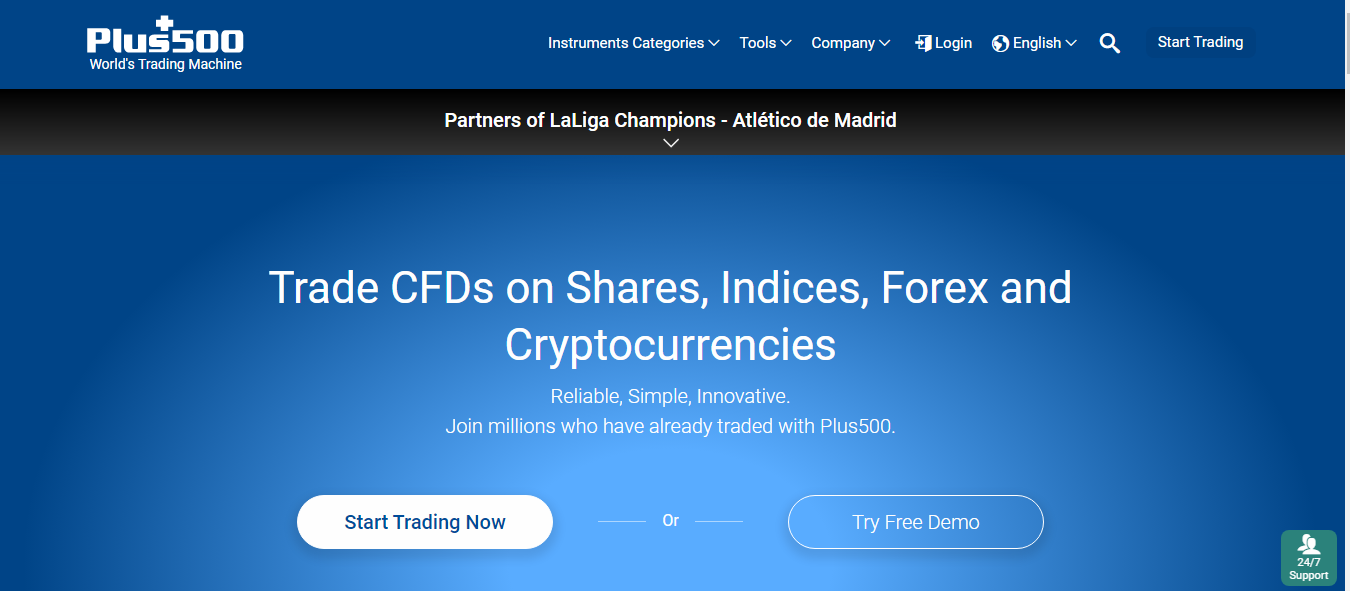
Platforms: Web, Desktop, Android, iOS
Launched in 2008, Plus500 has quickly grown into one of the preferred CFD brokers for UK customers. The platform is regulated by the Cyprus Securities and Exchange Commission (CySEC) and the UK FCA while offering access to a wide range of instruments.
Features
- 2000+ financial instruments.
- Demo account
- Professional accounts for experienced traders.
- Leverage and Margin Trading
- Insightful educational materials (Trader’s Guide.)
- Advanced trading and risk management tools.
Pros
- Plus500 offers prompt customer service via multiple channels including email, LiveChat, and WhatsApp.
- The platform is transparent regarding the fees associated with using their service.
- There are deposits or withdrawal fees other than those incurred with your bank.
- Plus500 offers a Crypto 10 Index, allowing investors to get exposure to the top ten cryptocurrencies via a single product.
- Users can fund their accounts using a variety of payment methods including PayPal, Skrill, Bank Transfer, credit and debit cards.
Cons
- An inactivity fee of $10 applies if a customer doesn’t log in to their account for three months.
- There is no social trading facility.
9. IG — Best CFD Broker With Most Markets

Platforms: Web, Android, iOS
Established in 1974, IG is another long-standing CFD broker that serves the UK audience. The company is authorised by the Bermuda Monetary Authority and claims to offer fast execution on a wide range of assets.
Features
- 17000+ markets
- Demo account
- Leverage trading
- IPO trading
- Advanced charting and risk management tools.
- Academy page for beginners.
- Corporate Accounts.
Pros
- IG has a proven track record and hence is a reliable CFD broker.
- Users get access to a wider spectrum of markets and financial assets.
- User-friendly interface across supported devices.
- Customer support is available via LiveChat email and phone.
- The platform allows for deposits via credit and debit cards, and bank transfers.
- There is a social community for IG users to share and discuss trade ideas.
Cons
- Fees are relatively higher when compared to newer competitors.
- IG has a four-hour closing window for crypto CFDs, during which investors may be unable to alter open positions.
- The minimum deposit is $250
10. SwitchMarkets — CFD Broker With Support for Crypto Deposit
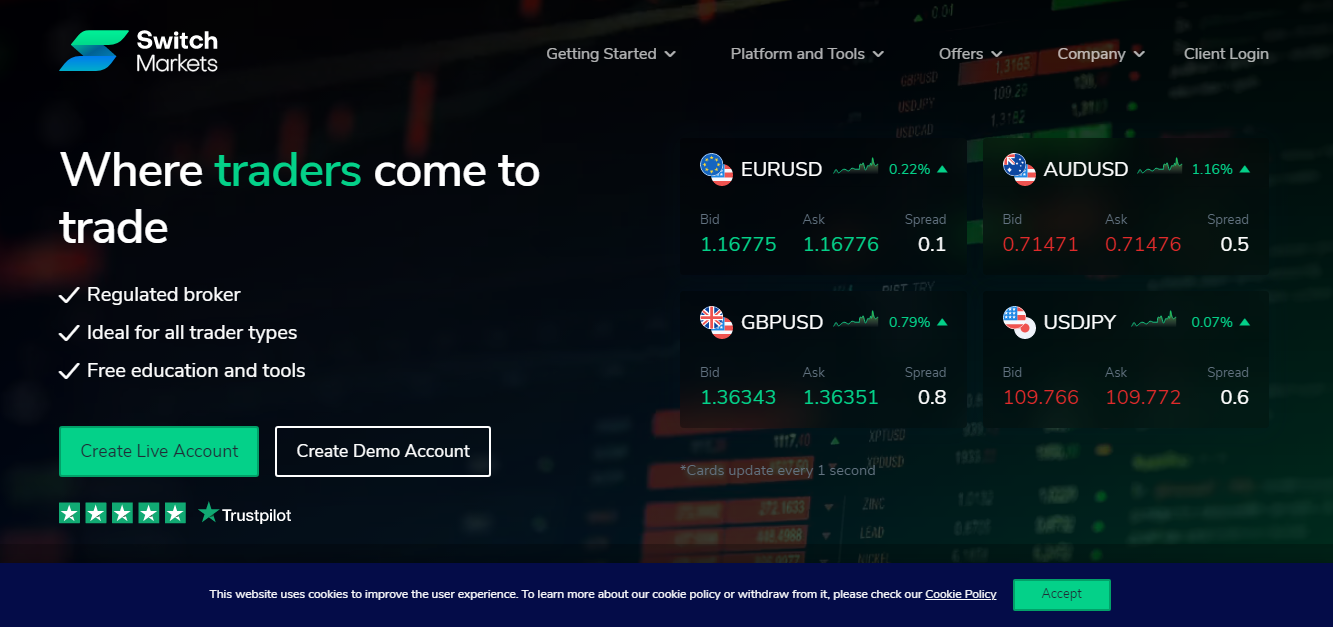
Platforms: Web and Mobile via MetaTrader4
Launched in 2019, SwitchMarkets lists CFDs for various markets such as cryptocurrencies, currencies, commodities, indices, and shares. The platform offers a modernised approach to trading, with an intuitive interface and relatively lower charges than others.
Features
- 180+ financial markets
- Zero commission accounts
- Demo accounts
- 100% deposit bonus
- Leverage trading up to 1:500
- Risk management EA
- Free VPS
- Islamic trading account
Pros
- SwitchMarkets supports the widest range of payment methods, including allowing users to fund their accounts using cryptocurrencies.
- The minimum deposit fee of $50 is relatively affordable for newcomers.
- There are no dormancy or inactivity fees.
- Customer support is readily available via LiveChat or email.
Cons
- SwitchMarkets only lists CFDs for four cryptocurrencies.
- The company is loosely regulated.
- Customer support is only available 24/5
11. Interactive Brokers — Best CFD Broker With Traditional Experience
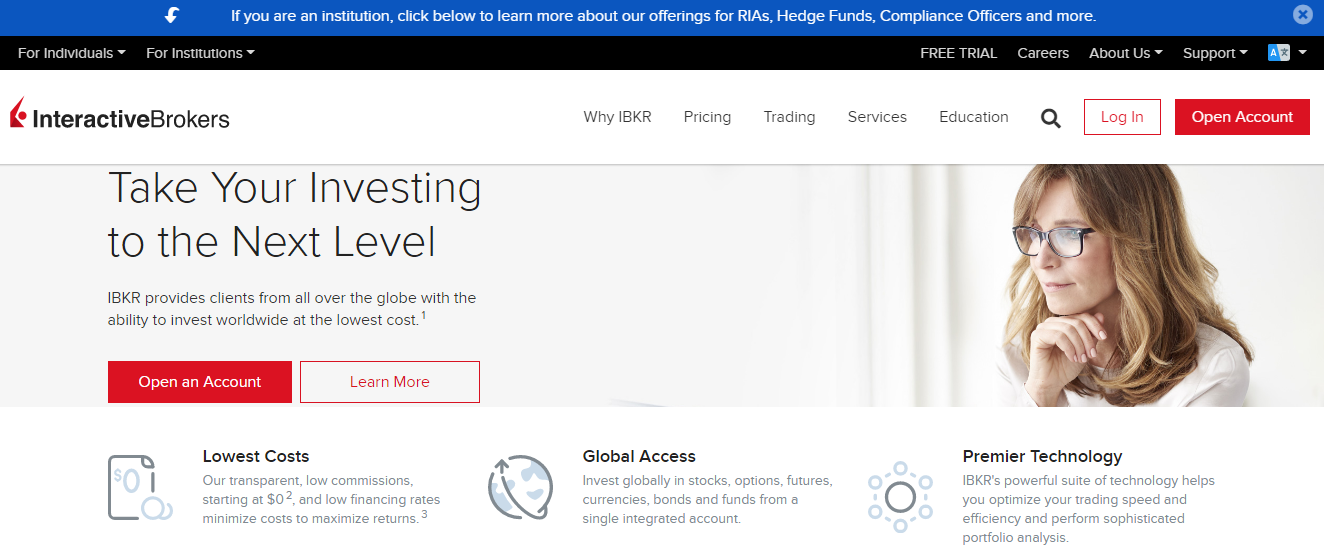
Platform: Web, Desktop (Windows), Mobile (iOS and Android).
Launched in 1977, Interactive Brokers is a traditional brokerage platform that has pivoted to the growing need for online-based trading products. The company is listed on NASDAQ and holds regulatory licenses in multiple jurisdictions, including the United Kingdom.
Features
- 100+ order types
- Demo Account
- Advanced trading risk management tools
- Multiple account types.
- Rich educational materials
- Portfolio Builder
- Market Signals
- Third-party research content.
- Margin trading.
Pros
- Interactive Brokers is a highly reputable brokerage platform
- Users enjoy zero commissions when trading in US stocks.
- Interactive Brokers offers custom account types that match the portfolio of an investor.
- Users can invest in Micro-Bitcoin futures offered by CME Group.
- There is no minimum deposit requirement for retail traders.
- There are also no inactivity fees for dormant accounts.
Cons
- The platform does not support direct crypto CFDs.
- The deposit process primarily involves ACH and wire transfers which may take a few days to settle.
- There is also no social trading feature to unite users.
How to choose the best CFD broker
Both new and experienced traders choose the best CFD brokerage platform by considering the following factors:
Reputation and Regulatory Standing: The best CFD brokers hold regulatory licenses in the region where they operate, and also have a proven track record for providing consistent trading facilities. The lengthy requirements and process involved in acquiring a regulatory license are why many shady brokers do not qualify for it.
However, if they cannot undergo the process of acquiring such licenses, then they may not be worth trusting with your hard-earned money.
Most regulated platforms often show off their licensing and regulatory qualifications on their website. Going through such documents can reinforce your confidence while trading with a brokerage platform, and also let you know where to file complaints if things go wrong.
Supported Markets: The best CFD brokers allow you access to most financial markets via a single account. Having access to stocks, currencies, cryptocurrencies, commodities, indices, and ETFs via a single broker saves you the stress of maintaining multiple trading accounts with different platforms.
It is worth noting at this point that the trading of crypto CFDs is banned by the UK FCA. Hence, most brokers do not allow UK persons to trade them. If you’re interested in getting exposure to cryptocurrencies, you can use any of the top crypto exchanges in the UK.
Customer Service: It is inevitable that you’ll have issues while using the brokerage platform. When such happens, you’d really prefer to get quick assistance. Experienced traders know that quickly resolving platform issues can sometimes be the difference between a winning or losing trade.
Choose only platforms with a quick response time for customer enquiries. Preferably customer support should be available via LiveChat or phone call. Email replies are not always effective at resolving certain issues.
Platform Features: Beyond offering a user-friendly interface, the best CFD brokers provide all the tools you need to be successful as a trader. Such features include advanced order book displays, charting tools, multiple order types, social trading, and more.
Remember that too many features might as well become a challenge, especially if you’re a new trader. Spend some time comparing features across platforms and settle for one that has a perfect blend of tools that match your trading experience.
Fees and Spreads: Choose a CFD broker that is transparent regarding fees associated with each asset or market. “Commission-free” trading is not always what it seems to be, and some brokers end up using fees and spread to their advantage. You can compare fees across different brokers before settling for one that doesn’t eat into your profits.
Payment Methods: Some brokers make it relatively easy for you to fund your account, and then impose multiple restrictions on withdrawals. However, the best CFD brokers allow you to add and withdraw money from your account using a variety of payment methods. Find one that offers a payment channel that is easily accessible in your jurisdiction.
Available Platforms: In this era of mobile trading, the best brokers are focused on providing user-friendly mobile applications that allow investors to manage their portfolios on the go. If you still prefer to trade on a desktop, you might want to check if the broker has desktop software and if it is compatible with your device.
How to become a CFD trader
CFDs are complex investment instruments and could result in substantial losses, especially if you’re not experienced. If you chose to become a CFD trader, you would need to spend quality time learning how the market works.
A short guide on how to start:
Education: You can spend time studying educational materials on trading provided by brokers or other online tutors. The knowledge that you should seek to acquire includes the basics of financial markets, how to order placements work on an exchange, how to do fundamental and technical analysis, etc. Armed with this knowledge, you would be better equipped to make sound investment decisions.
Practice With a Demo Account: Most CFD providers allow users to hone their trading skills via a demo account. A demo account is a simulated trading environment where users receive and trade with fake money.
The objective is to give you experience in the market without putting your capital on the line. Once they’re comfortable with the market and make tangible profits in a simulated environment, then they can feel confident about depositing and trading with real money.
Fund Your Brokerage Account: Upon completion of a successful demo trading experience, you can choose a CFD provider and fund your account. It is not compulsory to create an account with the same broker you used for your demo training, although it may be best to do so since you’re already familiar with the interface.
What you need to know before trading
Before you start trading CFDs, it is vital that you keep these points in mind.
Choose and Master a Market: New traders often make the mistake of trying to trade multiple markets, e.g., stocks, commodities, indices, all at once. However, experience has shown that it is often best to spend time studying and gaining mastery of a single asset or market before moving on to the next.
Gauge Market Sentiment: Most CFD trading platforms provide users with market sentiment analysis tools. An excellent example is the Fear and Greed Index.
The Fear and Greed Index gauge market sentiment by measuring whether investors are being fearful or greedy. Experienced traders buy when the market is in fear mode and exit their positions when everyone gets greedy.
Another indicator is the buyer/seller percentage ratio which tells what fraction of the market is selling or buying. If for instance, 78% of investors are selling an asset while 22% are buying, then you can decide to buy the asset since the majority of markets are often irrational and only buy an asset when prices are already high.
Understanding Leverage Trading: Leverage trading involves trading with more capital than you originally deposited in your account. For most CFD brokers, leverage trading could be as low as 1:20 or as high as 1:500.
A leveraged trader borrows funds from the broker with the target of paying back if trades go their way. Since there’s more capital on the line, the trader stands the chance of making larger profits and paying back the borrowed funds.
It is easy, though, to ignore the fact that trading with more capital can also increase losses if the trade goes in the wrong direction. Traders can lose their initial deposit via liquidation for a lower price movement than they would have if they didn’t use leverage.
For this reason, users are advised to attain a high level of experience before using leverage or margin trading. Also, when leverage must be used, it is best to still with a ratio that one that can afford to lose.
Stop/Loss Orders: Stop/loss is a risk management order type that allows traders to define a particular price range that they wish to close a trade to minimize further losses.
For instance, if a trader goes long on an asset with a market price of £200, they could have a liquidation price set at £160, depending on the value of assets they deposited as collateral. However, the trade could put a stop/loss order at a £175 price. By doing so, he would be closed out of the trade when the price drops to that level, reducing the amount he could have lost if the price had dropped even further to his quoted liquidation price.
Stop/loss orders are automatically triggered when the price level is hit, and are thus great protection against market volatility, especially when a trader isn't actively monitoring the trade.
Are CFD platforms safe?
CFDs platforms are as safe as the companies or individuals running the business. As noted earlier, it may be best to register only with companies that are regulated to serve users from your jurisdiction.
Choosing such brokers means that you can legally file complaints against the company when things go wrong. It also entitles you to insurance cover from the Financial Services Compensation Scheme (FSCS) in the event that the broker files for bankruptcy or suffers any substantial financial losses.
F.A.Qs
What is the Minimum Amount for CFD Trading?
The minimum amount would usually depend on the broker you choose. CFD positions could be opened for as low as £20 on some platforms while others require as high as £100.
How Long Can One Hold a CFD Position?
Unlike futures contracts, CFDs do not have an expiry date. Therefore, you can hold both short or long positions for as long as you can fund it. There are normally fees associated with holding a position, and you must factor this into your cost basis when calculating profits and losses for that particular trade.
If you plan to hold stock for a long time, then you may be better off buying them directly rather than through a CFD product.
Do I Receive Stock Dividends for Holding CFDs?
When you buy a CFD, you’re only getting exposure to the price movement of a stock and not the underlying asset. For this reason, you are not usually entitled to receive dividends distributed by the company.,
However, some brokers like the City Index give customers exposure to dividends. You can check with your broker to find out what dividend rules apply to stocks you hold on their platform, especially around dividend distribution dates.
Can You Become a Millionaire Trading CFDs?
It is possible to become a millionaire trading CFDs. It depends on how much you start with, and how disciplined you are with managing your portfolio. A person who starts off with £500 would require a lot more time and effort to get to £1 million, while someone who starts with £800,000 will likely get there within a shorter time. If you can manage your emotions, and minimise losses to the barest minimum, there is a greater chance that you’ll meet the target within a few years.
Why Are Crypto CFDs Banned in the UK?
The United Kingdom Financial Conduct Authority (FCA) has banned the sale of crypto-based derivatives to retail investors. The ban came into effect on January 6, 2021, and explains why most online CFD trading platforms hide the option from UK customers or even do not allow them to register.
According to the FCA, cryptocurrencies are already volatile investment products, and accessing them via derivatives products like CFDs is highly risky for retail investors who may not have sufficient knowledge about how the crypto market works.
Conclusion
With discipline and effort, trading CFDs can be very profitable. There are many online CFD trading platforms serving the UK market today. However, choosing the right broker reduces your chances of losing funds and lets you focus on growing your capital.
This article reviewed the best ten CFD providers, considering platforms they support, features, pros, and cons, as well as other information that traders need to consider while making a decision. It also provided guidance for new traders, reviewing what they need to know to get started and answers to frequently asked questions about CFDs.
Armed with this information, you’re more ready to enter the CFD market, and make a success out of it!





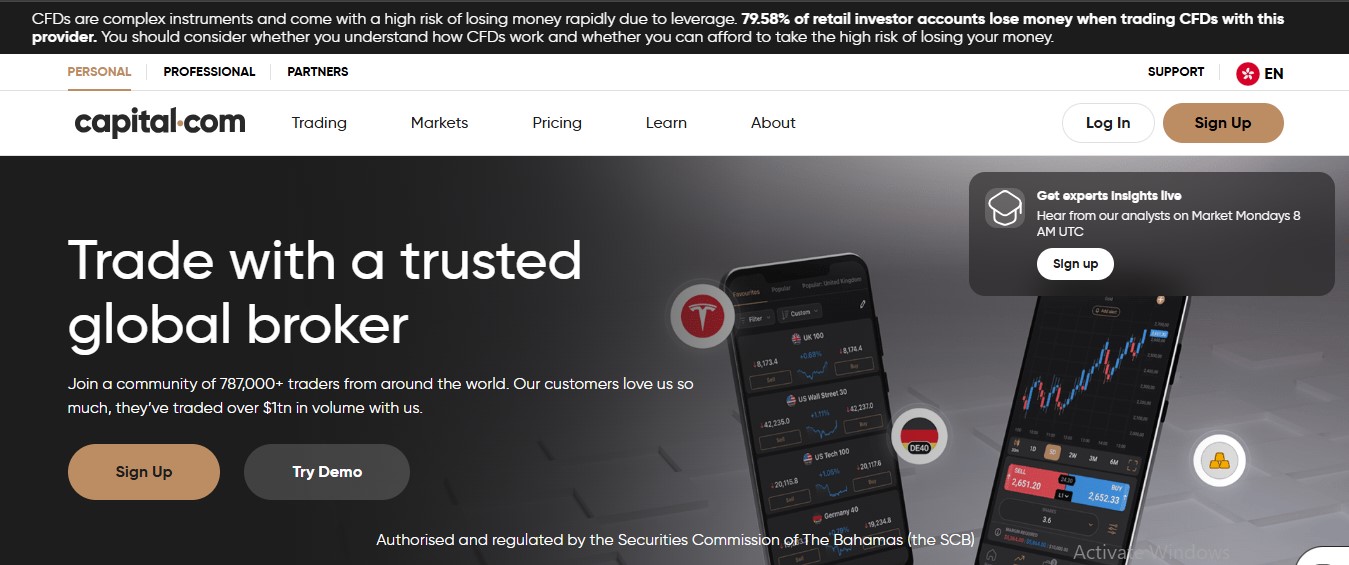
 usdt
usdt xrp
xrp

